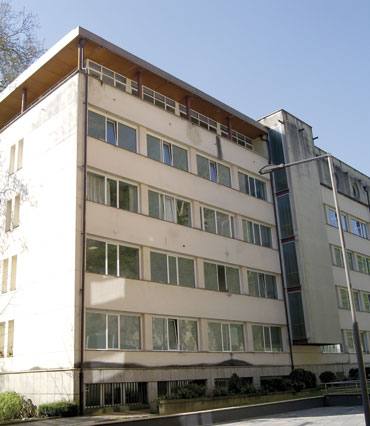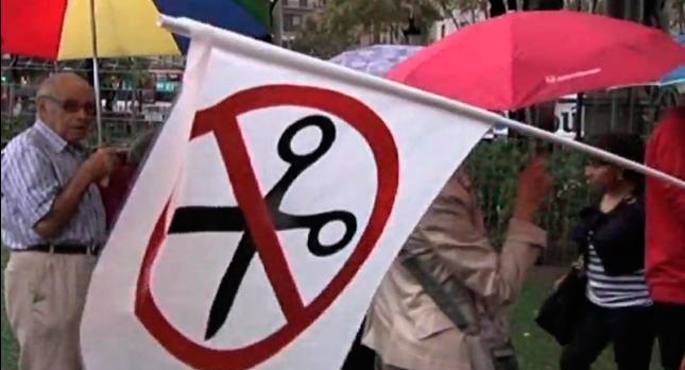Public vs. Concert
- The ambulatory specialty of Toulouse and the Asuncion Clinic. Tolosaldea is the only one in Gipuzkoa that does not have a regional hospital. These two centers (one public, the other concert) have offered the specialty care until today, but they have been evacuating the ambulatory and strengthening the clinic. The Department of Health of the Basque Government expects that in three years all specialties will be transferred to Asunción. On the other hand, the Tolosaldea Public Health Platform works for the strengthening of the outpatient clinic and the installation of a regional public hospital.

The region of Tolosaldea has a population of 65,191 inhabitants, divided into 31 municipalities. In the area of health, Elena Elosegui, director of the Department of Health of the Basque Government, tells us that it has its peculiarities: “Primary care services [family doctor] are provided by Osakidetza, while Specialized Care is provided by Osakidetza and the Asunción clinic: the first through an outpatient clinic with specialties, where several specialists of the San Sebastian Hospital provide the service; and the second, guaranteeing a large number of hospitalizations and a large part of the specialized outpatient care. This clinic offers less services than the hospitals in the regions of Gipuzkoa (Mendaro, Arrasate, Bidasoa and Zumarraga). In addition, some of these services and specialties are duplicated because they are provided simultaneously by the San Sebastian Hospital and the Asuncion clinic.”
Iñigo Dendaluce, manager of the Asunción clinic, emphasizes this duplication of specialties as the main reason for the reorganization of the Health Department: “The goal of the Department of Health is to unite the provision of services by providing rationality. It is absurd to give specialties in two branches, that is, one patient goes to the outpatient clinic in Toulouse for cardiology and another to Asunción. Now we are trying to regulate the new agreement, we would take full specialized care, and in the ambulatory the Primary Care would be offered.”
On the other hand, the Tolosaldea Platform for Public Health (TOPA) does not agree with the concert of specialties with the private clinic. According to the local physician (who prefers to protect the name in privacy): “We are told that the Asunción Clinic will henceforth perform the function of a regional hospital. We don’t want anything that fulfills this function, we want the regional public hospital directly. As the rest of the population of Gipuzkoa have, we pay our taxes in their own way. If Tolosaldea is going to have a real regional hospital, the solution is to follow the model of the hospitals of Deba or San Eloy, although doing so will end the cake for some.” According to Dendaluce: “We are confusing the patient when we tell him that he is discriminated against, that he is not offering public service and that he is privatizing health... He's offering a public service, but the management is private. I can take my daughter to school, and she's getting a public service, but in a concert center. Same with health.”
The TOPA doctor confirms that health management must be public: “Because all resources in the public system are for health. But 30% of the money that comes to a private company is for the company to do business. With 7 euros you can’t pay attention to 10. What is this doing? On the one hand, workers have to work in worse conditions, and if you have worse conditions you offer worse care, whether you want it or not. On the other hand, services are reduced, it is not possible to offer the same service with less money. Now they tell us that no, it will be the same attention... but there will come a time when they will tell us that ‘since we don’t have money, we can’t give full attention’. A private center will never be able to provide the same services as a public hospital, because the private one is aimed at achieving economic performance, and the public only supports the health of the population.” The manager Dendaluce says that money is not their priority: “If we currently carry out 65,000 consultations, taking responsibility for the specialties of Tolosaldea into our hands, we would increase the number of consultations by 80%. Of course, this will have its economic impact, but we have not yet assessed it, because it is not the issue that concerns us the most now. The priority for us is to provide an excellent service, but logically with the criticisms of profitability and efficiency.” The TOPA doctor foresees: “When the experiment hits the bottom, we will have to put more public money into the private clinic, as we have seen in eleven cases in this crisis.”
In three years all the specialties will move to Asunción
The staff of the Tolosa Outpatient Center (who also want the name to be kept private) say that the process of transferring the specialties to Asunción is not new, it comes from 2007. According to Elena Elosegui, “On October 29, 2007, the Health Department sent to Parliament a research proposal for this health region, which contained three planning and organizational proposals. Although it was discussed at length, no decision was taken by the previous Government. The current approach includes one of these three proposals.” In other words, the approach proposed by the PNV in 2007 and voted against by the PSOE is now what the PSOE is trying to do. The ambulatory staff denounces that although this proposal was not approved, in practice steps have been taken to transfer the specialties to Asunción: “At the time, the outpatient clinic was refurbished, with infrastructures to carry out minor surgeries on site, endoscopies, etc. But even though they were prepared, all this was never done there, since the people in charge referred the patients to the clinic in Asunción to perform these procedures. When the ophthalmology plaza became isolated, the same managers transferred this position to Asunción, although there were specialists willing to cover it in the ambulatory. A few years ago, the Urology Square was released due to a long period of absence. Also in this case, no substitute was brought from Osakidetza; it was delivered to the Asunción clinic, which, since they did not have specialists, hired the urologist of the Zumarraga hospital (public). He took a leave of absence to go to the private centre, where he received the patients from Osakidetza. When his discharge ended, the urologist from the Tolosa Outpatient Clinic started again in Osakidetza, but not in the Tolosa Outpatient Clinic where he had his place, but in San Sebastián. At the same time, he received some patients from Tolosaldea in private consultation at the Asunción clinic. Rehabilitation at the outpatient clinic in Toulouse has also been reduced to minorities and transferred to Asunción. This ambulatory has the capacity to provide many more specialties, but they are gradually being emptied.”
Dendaluce has listed the specialties of the Tolosa Outpatient Clinic that Asunción would take care of according to the plan: “Cardiology, dermatology, digestive, endocrinology, neumology, neurology, gynecology, general surgery, ophthalmology, otorhinolaryngology, traumatology and rehabilitation. We already have these specialties in Asunción. The idea is that, over time, all these activities will be absorbed by us.” We asked them if they would need to increase their staff and infrastructure: “We’re going to have to increase staff, we’re going to need more medical specialists, as well as assistants and assistants. We have a plan to expand the clinic and we will start the works after the summer: we will make a new building attached to the current one. It will have a basement and three floors. We will reorganize the entire hospital and increase our assistance offer by 3,000 square meters. The place won’t be a problem.”
New services will be offered by Asunción
Elena Elosegui mentions among the benefits that will be obtained with this plan “the availability of services that do not currently exist, close to the community (home hospitalization service, subacute unit and home rehabilitation).” Dendaluce explains to us what these new services are: “Home hospitalization is a service in which the patient is hospitalized for fewer days and the last days of hospitalization are spent at home. Two to three doctors and several nurses make home visits. This service is now carried out by the provincial hospital and would be provided by Asunción. Through home rehabilitation, patients with problems coming to the center are allowed to undergo rehabilitation at home. This is absolutely groundbreaking in Gipuzkoa. And finally, the subacute unit: when a patient has received full hospital care but is not able to go home, he goes to another center before returning to his home or residence. In Gipuzkoa this service is provided only in San Sebastian (Matia). We would have 12-14 beds in the sub-acute unit.”
Are you going to bring a drink or not?
On what basis will Asunción be paid in the future? According to Elena Elosegui: “The clinic will be provided with adequate funding, taking into account its population; and the framework for evaluating the results will have to be very precise. Under no circumstances will the Asunción Clinic be allowed to charge anything in exchange for services with coverage in Osakidetza. Health care will be free, as it has been until now.”
According to Dendaluce: “What will be paid for in the future is what remains to be determined. The Health Department is proposing a capital payment, that is, there are so many inhabitants in Tolosaldea, and I will pay you so much per inhabitant for the assistance of the Amularia. It’s not closed.”
According to the TOPA doctor: “So far the Health Department has paid them for every medical action: They give you tests in Asunción, they pay you so much, they give you an x-ray, so much. In this way, the clinic is interested in providing as many services as possible. And some users are also interested in this (some people like to do an MRI because of a stroke): hunger and appetite came together. Now it will be paid per capita, that is, per cartel. Therefore, they will receive a fixed amount of money per year. As a result, the least amount of services will be of interest to the clinic. If I get $100, it’s better to spend $40 than $50.”
As far as payment is concerned, the platforms go further: “We know this is the first step. And the second step will be the cobbler. This will be the pilot plan, and if it goes well, then it will be extended to the entire CAV.” We asked Dendaluce directly about the drink: is there a risk that the patient will end the treatment (due to a complication, etc.) and have to bear the costs? “No, not at all. In principle, the Department of Health would cover the costs of complicated cases independently. If it is deficient, this will never affect the patients. The patient will never have to pay anything because it is a public service.”
At what point is the plan?
According to Elena Elosegui: “The Health Committee of the Basque Parliament approved on 8 February, signed by the PSE and EAJ, an illegal proposal –the Aralar group voted against it– in which the Basque Government was asked to draw up a health care plan for this subregion in support of the mixed supply model [First public care and specialties and hospitalization concerted], respecting the rights of the workers of the Hospital Donostia. In 2011, we want to move forward in the following phases: the pact between the Health Department and the clinic will have to be updated. The Asunción Clinic will gradually develop the offer of services that a regional hospital has (such as the Bidasoa Hospital offer).”
For TOPA members, now is the time to move: “They don’t have it so clear either: they are giving both images at the same time, they are afraid of the answer they will have. Depending on the reaction, it is possible to reject the plan, move forward, or take even more drastic steps towards privatization and coupage. This has not been decided, and stronger walls have fallen.”
The Platform held a round table on 5 May to consult the local political parties on this specific issue: “This is a very important issue, and we have asked all political parties to position themselves, to say clearly what kind of health they are in favour of and what they are willing to do on this issue. People want to know before they vote.” You have the chronicle of that roundtable www.argia.eus on the site, linked to this report.
Tolosaldea Osasun Publikoaren Alde plataformak Ignominia bati buruzko gogoetak, edo nola pribatizatu Osasuna alebosiaz eta pausoz pauso artikulua zabaldu du, Asuncionen lan egin zuen mediku batek idatzia. Bertan kontatzen denez, planaren atzean trama oso hau dago:
“90eko hamarkadaren erdialdean, Asuncioneko gerente izendatu berri zen Jesús Gómez Montoyak behin baino gehiagotan adierazi zuen Tolosaldeko osasun arreta kudeatzeko nahia. 2000. urte aldera, orduan Osasun Saileko Gipuzkoako zuzendaria zen Rafael Cerdánek, Tolosako anbulatorioko langileei adierazi zien eskualdeko arreta espezializatua Asuncion klinikari uzteko asmoa. Ordutik hona Asuncion klinika sustatu dutela ikusi dugu, espezialitate anbulatorioaren kaltetan, zeina pixkanaka desmantelatzen joan den.
(...)
Azken urteetan, Rafael Cerdán Osasun sailburu-orde zela, Asuncion klinikak pausoak eman ditu eskualdeko osasunak klinika honekiko gero eta dependentzia handiagoa izan dezan. Norabide honetan egin da Lehen Mailako arretako anbulatorioen eta klinikaren arteko lotura informatikoa, Tolosan eta Andoainen kontsultak egiteko irekitako Asuncioneko zentro berriak...
Beste datu esanguratsu bat da José Agustín Aguirrek Asuncion klinikako (jabego pribatua) zuzendari mediku postura egindako “desenbarkua”, Donostiako ospitalean (jabego publikoa) kargu bera utzi ostean.
Eta aurrekariak borobilduz, gaur egun Rafael Cerdán Asuncion klinikako zuzendaritzan ikusten dugu. Hau da, Osasun Saileko Gipuzkoako zuzendari izatetik, Osasun sailburu-orde izatera pasa zen eta handik Asuncion klinikako zuzendaritzara.
Ondorioz, orain proiektu berritzailetzat eskaintzen zaiguna, enpresari pribatu baten aspirazioa da: bera bakarrik edo besteekin batera, pixkanaka plan ezkutua garatzen joan da osasun publikoko arduradunekin elkarlanean, hamar urte baino gehiagoz.
(...)
Askoren beldurra da hau entsegu bat dela, aurrerantzean emango diren pribatizazioena. Ur publikoetan zein pribatuetan igeri egiten duten gestoreek bultzatuko dituzte pribatizazio horiek, norberaren onuretan pentsatuz eta ez herritarrenean”.
Hogei erakunde hauek osatzen dute: Ezker Abertzalea, Aralar (eta Tolosako Aralar) eta Ezker Batua alderdi politikoek; ELA, LAB, CCOO, UGT eta EHNE sindikatuek; Amarotz auzo elkartea, Bonberenea, Tolosako denbora-bankua, Arpegi eta Zahartzaro Duinaren aldeko plataforma herri ekimenek; genero berdintasunaren aldeko Bilgune Feministak eta Berdinbidek; Euskal Herria Sozialista, Gazte Independentistak eta Herria Abian mugimenduek eta Osasun Publikoko langileek.
Eskualde-ospitale publiko baten aldeko 12.000 sinaduratik gora bildu dituzte (maiatzaren 5ean) eta manifestazioa deitu dute maiatzaren 14rako (12:00etan Tolosako Triangulo plazatik hasita).
Maiatzaren 5ean mahai-ingurua antolatu zuen Tolosaldea Osasun Publikoaren Alde plataformak, alderdi politiko bakoitzak garbi erantzun ziezaien bi galdera hauei:
1. Tolosako espezialitate-anbulatorioak zerbitzu ona eman dezan, zer giza baliabide eta azpiegitura jarriko ditu zure alderdiak?
2. Zure alderdiak ahalbidetuko du Tolosaldeak eskualde-ospitale publiko bat izatea?
Sei politikari hauek hartu zuten parte: Jose Maria Vieites, EBtik Tolosarako alkategaia; Ibai Iriarte, Bildutik Tolosarako alkategaia; Luke Uribe-Etxebarria, EAJtik Asteasurako alkategaia; Suny Guerra, PPtik Andoainerako alkategaia; Iñaki Irazabalbeitia, Aralartik Tolosako alkategaia; eta Jabier Telleria, Hamaika Batetik Tolosarako alkategaia.
Horman zenbaki handi bat ikusten zen: 11.723 sinadura bilduak zituen egun horretarako plataformak, Osasun Sailak espezialitate denak Asuncion Klinika pribatura pasatzeko duen plana gaitzesten dutenak. Triangulo plazako Kultur Etxeko beheko aretoa erabat bete zen, eta osasun langile asko ikus zitekeen haien artean, edo plataformako kideak bestela... alegia, gaian oso jantzitako jendea, galderen txanda iritsi zenean ikusi zenez.
Hona lehen galderaren (Zer baliabide jarriko ditu zure alderdiak anbulatorioan?) erantzunen laburpena:
Vieites, EB: Galdera teknikoegia da, eta aditua ez naizenez, anbulatorioko arduradunekin elkarlanean hartuko ditut erabaki zehatzak, baina gure jarrera argia da: osasunean arreta hobetzeko modu bakarra dago, baliabide ekonomiko eta langile gehiago jartzea. Pribatizazio saiakera hau salatzen dugu, gainera kargu publikoetan dauden pertsonek bultzatutakoa delako. Osasuna denok ordaintzen dugu, eta inork ez die politikariei baimenik eman pribatizatzeko. Zergatik nahi dute politikari batzuek ongizate estatuaren oinarriak diren zerbitzu publikoak pribatizatu? Hori lortzeko ohiko taktika erabiltzen dute: lehenik sasi arazoak sortzen dituzte, arazorik ez dagoen lekuan (itxaron zerrenda luzeak, gaixoak pribatura bideratzea...), ondoren esateko irtenbidea osasun pribatua dela. "Arduragabekeria hutsa" da kasu hau.
Iriarte, Bildu: Ez naiz medikua, eta ez dut neurri zehatzez hitz egingo, baina gure jarrera argia da: osasun zerbitzua eskubide unibertsala da. Krisia berau zapuzteko baliatu nahi dute, eta juxtu garai hauetan da garrantzitsua eskubide unibertsalak mantentzea. Plataformako kide moduan bileretatik "pozik eta harro" joan izan naiz etxera, herri mugimendu zabala jarri delako martxan, eta hor ikusten delako gestore publikoek ezin dutela nahi duten guztia egin. "%100 doan eta publikoa izan behar du zerbitzuak eta gestioak". Eta Europar Batasuneko datuekin alderatuta, osasunean gutxiegi gastatzen dugu: 2010eko datuen arabera, EBn batez beste 2.013 euro gastatu zen osasunean pertsonako, eta EAEn, aldiz, 1.573 euro; bertako errenta EBko batez bestekoa baino handiagoa denean. "Superportuak, erraustegiak, eta horrelakoak egiteko bai, beti dago dirua".
Uribe-Etxebarria, EAJ: Tolosaldean, "arrazoi historikoengatik, sistema mistoa" dago, eta gure alderdiak, herrian zegoen kezka jasoaz, Eusko Legebiltzarrean legez besteko proposamena aurkeztu zuen 2010eko abenduaren 10ean. Otsailean eztabaidatu zen proposamen hori, eta aurrera atera da. "Kezkatuak" geunden Bengoa Osasun sailburuak hartuak omen zituen erabakiekin, eta legez besteko proposamen horren bidez proiektua gelditu eta erabakia patxada gehiagorekin hartzera behartu genuen: proposamen horretan Osasun Sailari eskatzen zaio 4 hilabeteko epean (beraz, ekainerako) proiektua aurkez dezala Legebiltzarrean, eredu mistoa mantenduz (lehen mailako arreta anbulatorio publikoan eta espezialitateak Asuncionen), langileen baldintzak bermatuz. Une honetan Osasun saila informea lantzen ari da, eta informea iristen denean, alderdian aztertuko dugu eta gure ekarpenak egingo dizkiogu.
Guerra, PP: "Tolosako osasungintzak min ematen dit". 60ko hamarkadan anbulatorio ederra zuen, eta galtzen joan da, "ez dugulako etorkizun ikuspegirik izan: zerbitzu asko eskaintzen ziren bertan baina langile eta azpiegitura nahikorik jarri gabe, eta honek itxaron zerrenda luzeak eragin zituen". Duela 20 urte Osasun Sailak Asuncion Klinika pribatuarekin egin zuen hitzarmenak irregulartasun handiak zituen: erakunde publiko batek ezin duelako enpresa pribatu batekin hitzarmenik egin, azken honek zorrak baditu. Eta Asuncionek 100 milioi inguruko zorra zuen ogasunarekin, eta beste hainbeste gizarte segurantzarekin. Diru publikoa enpresa pribatu horretara bideratu zen, eta gainera, enpresa horrek zorra handitu egin zuen. Uribe-Etxeberria jauna: 2006tik hona EAJren planteamendua Tolosaldeako zerbitzuak pribatizatzea izan da, eta orain zertara dator Bengoari informeak eskatzea? Aspalditik oso lotua dago plan hau, urte askotan hartutako erabakiak horra bideratuta egon dira, baina nahiago nuke atzera bueltarik balu.
Uribe-Etxebarria: "Mesedez, zer diozu, EAJren planteamendua espezialitatea pribatizatzea zela?".
Aretoko publiko osoak: "Baaaaaiiii!".
Irazabalbeitia, Aralar: Bengoak emandako datuen arabera, anbulatorioak eta Asuncionek urtean 100.000 kontsulta hartzen dituzte, erdi eta erdi; baina joera Asuncionen aldekoa da. Aralarrek Tolosako udalean urtarrilean mozioa aurkeztu zuen, batetik Tolosaldearako zeuden asmoez galdetuz, bestetik osasun publikoaren aldeko aldarria eginez, eta hirugarrenik eskualde-ospitale publiko baten azterketa egiteko eskatuz. Mozioa onartu zen eta Tolosaldeako udaletara zabaldu.
Telleria, Hamaika Bat: Gure lehentasuna ahalik zerbitzu onena izatea da. "Hori nola egiten den?", badira modu desberdinak: publikoa, pribatua eta mistoa. "Gu printzipioz publikoaren alde gaude", baina tokian tokiko egoeretara egokitu behar da. Alderdi berria izanagatik, politikan urte asko daramatzagu, eta 1992an Tolosako alderdi guztiek adostasuna lortu genuen: eskualde-ospitalea eskatu genuen denek batera eta Asuncionekin hitzarmen on bat lortu zen.
Bigarren galderaren txanda (Zure alderdiak ahalbidetuko du Tolosaldeak eskualde-ospitale publiko bat izatea?) elkarri erantzuteko baliatu zuten:
Vieites, EB: Uribe-Etxebarria, informea behar da baina zer erabakitzeko, osasun publikoa edo pribatua nahi dugun? Eta zonalde diskriminatua izaten jarraituko duen Tolosaldeak? Ikerketa behar da, zenbat baliabide behar diren jakiteko, horretarako besterik ez. Bengoa lehendik datorren plan bat bukatzen ari da. Zein den neurria? Mobilizazioa. Nik oso garbi dut: udalean egoteko ohorea badut, uko egingo diet operazio ekonomikoei eta Asuncion enpresa indartuko duen edozein planteamenduri, Asuncion publikoa ez den artean. Desegin dezagun, desmantelatu.
Iriarte, Bildu: Galderarentzat erantzun garbia dugu: bai (tonuaz indartu eta azpimarratu zuen). San Eloy eta Deba Garaiko ospitaleak pribatuak ziren lehenago, eta publifikatu egin ziren. Beraz, posible da Tolosaldean gauza bera egitea. Informeak eskatzen dituenaren araberakoak izaten dira, eta gero erabili egiten dira gestio publikoa ez dela errentagarri esateko: baina osasun publikoan 10 txanpon jartzen baditut, 10 horiek osasunera bideratzen dira. Aldiz, gestio pribatuan 10 txanponetik 3 irabazietara doaz, eta beraz, ezin da zerbitzu bera eskaini 10 txanponekin eta 7rekin. Orain, larrialdietako zirrikitua baliatzen dugu Donostiako Ospitalera joateko (seinale Asuncionek ez digula konfiantza bera ematen), baina laster itxiko zaigu aukera hori eta derrigor joan beharko dugu Asuncionera. Gainera ordainketa modua aldatuko da (orain arte Asuncioni egindako froga eta ekintza bakoitzeko ordaindu dio Osasun Sailak, baina gerora biztanleko hainbesteko bat ordaintzea aurreikusten da), eta horrek eragin zuzena izango du eskainiko zaigun arretan.
Uribe-Etxebarria, EAJ: Guk galderari "bai" erantzuten diogu. Helburua osasun zerbitzu ona eskaintzea da, kalitatezkoa, eta helburu hori lortzeko bitarteko desberdinak daude. Diru publikoaren kudeaketa eraginkorra egingo dugu. PPk EAJren legez besteko proposamenaren alde bozkatu du, beraz, Guerra, ez dut ulertzen zure jarrera. Hau esanik, Asuncionekin egindako hitzarmena nola izan zen azalduko dut: 1988-1991 arteko hitzarmena sinatu zenean PSOE zegoen Osasun sailean, eta diru publikoa eman zion inongo kontrolik gabe, "subentzio hutsa zen", enpresaren finantza beharrei erantzuteko emandako dirua, bueltan eskaini beharreko zerbitzurik edo helbururik ere eskatzen ez zuena. 1992an Osasun sailean EAJ zegoen, eta hitzarmenetik kontzertura pasa ginen: dirua eman zitzaion baina zerbitzu batzuen truke, exijentzia eta emaitzak eskatuta. Bukatzeko, herri bakoitzean bertako ezaugarrietara moldatu behar da: "hezkuntza bezala da, ikastola eta ikastetxe erlijioso kontzertatuak ditugu". Iriartek dio enpresa pribatu baten helburua errentagarritasuna dela, baina kontzertatzen bada, helburuak ezin du hori izan. [Publikoaren barre ozena, esaldi hau entzutean]. Baliabide bat baldin badugu, Asuncion, pribatua dena, zer egin behar da, berau itxi? 300 familia bota? [Publikoan zurrumurrua zabaldu zen].
Guerra, PP: "Oso gogorra egiten zait 300 familia kaleratzearen errua hemen aurrean daudenei leporatzea. "Errua enpresa horren gestio txarrarena da". Gakoa ordainketa modua da: nola ordainduko da, pertsonako edo zerbitzuko? Zeren ordainketa modu bakoitzak badu bere arriskua: zerbitzuka ordainduz gero, alferrikako froga mordoa egiten delako diru publikoaren kontura, eta pertsonako ordaintzen bada, berriz, beharrezko diren frogak ere ez egiteko arriskua dagoelako: "Iriartek oso ongi esan duen bezala, irabazi asmodun enpresa delako. Tolosaldeak ospitale publiko bat behar du, Donostiatik gertu egoteagatik ez du anaia pobrea izan behar. Bukatzeko, azken arrisku bat ikusten dut: "klinika berean osasun publikoa eta pribatua egiten denean, mailak sortu daitezke".
Irazabalbeitia, Aralar: Guk ere galderari "bai" erantzuten diogu. Kontua da eskualde-ospitale hori nola egin: Hutsetik hasi edo anbulatorioa indartzetik? Edo eskualdeko osasun azpiegiturak baliatuta: Asuncion publifikatu eta anbulatorioarekin bat eginda, zerbitzu batzuk batean eta besteak bestean eskainita... Asuncioneko langileei euren lanpostuak mantentzeko aukera dago, horrela eginez gero. Baina Tolosaldeari eskualde-ospitale publikoa dagokio, biztanle eta kontsulta datuek ematen dutelako.
Telleria, Hamaika Bat: "Zer da osasun publikoa? Guretzat, unibertsala eta kalitatezkoa dena. Erregeei gutuna idatz diezaiekegu, espezialista onenak ekarri eta sekulako ospitalea egiteko eskatuz. Asuncion erostea nahi nuke nik ere, baina ez da erreala". Baina publikoa edo pribatua izateak ez du bermatzen zerbitzu ona eskainiko denik, ezta baliabide asko izateak ere, nahikoak behar dira. Ezin ditugu dauzkagun baliabideak (Asuncion klinika tartean) desaprobetxatu. Gu ospitale-publikoaren alde gaude, baina planifikatu egin behar da eta informeak horretarako behar dira, planifikatzeko. Osasun sailak egiten duen ikerketa aztertuko dugu, eta orduan hitz egingo dugu berriz. Alderdi guztiok elkarrekin joan behar dugu, 1992 hartan bezala.
Bukatzeko, publikoari ireki zitzaion galderak egiteko txanda. Haien artetik hiru ekarri ditugu:
1992an Asuncionekin kontzertu bat adostu beharrean, klinika erosi egin behar zela esan zion Uribetxebarriari plataformako kide batek, Asuncion zorretan itota zegoelako momentu hartan. Munduan ematen ari den osasunaren pribatizazioarekin bat datorrela plan hau ohartarazi zuen, eta EAJk informea eskatu badu, helburu bakarrarekin eskatu duela salatu: gaia atzeratu dadin, maiatza pasatu dadin eta beraz hauteskundeak ere bai, eta horrela, erabaki horrek ekarriko dion prezio politikoa ordaindu ez dezan.
Bigarren pertsona batek bi galdera zehatz erantzuteko atakan jarri zituen: Nork sinatuko duzue plataformaren manifestua? Nor joango zarete maiatzaren 14ko manifestaziora? EB, Bildu, Aralar eta PPk sinatu zuten, eta lau hauek hartu zuten joateko konpromisoa (PPren kasuan ez Guerrak berak, kanpoan delako egun horretan, baina Tolosako ordezkariak egotea espero duela esan zuen). EAJko eta Hamaika Bateko ordezkariek esan zuten Osasun sailaren informearen zain geratzen zirela erantzun bat emateko, eta Hamaika Bateko ordezkariak gaineratu zuen "ez nago ados idatziarekin". Manifestazioan ere ez dute bi hauek parte hartuko.
Hirugarrenik, Asuncion klinikako langile batek esan zuen Asuncioneko gaixoen %90-%99 artean, osasun publikokoak direla eta bera ere publifikatzearen alde agertu zen.
Botiken berrordainketa sistema martxan da astelehenetik aurrera Araban, Bizkaian eta Gipuzkoan. Herritarrek euren soldataren araberako gainprezioa ordaindu beharko dute botikengatik. Prestaziorik gabeko langabeek eta pentsio minimoa duten erretiratuek ez dute ordaindu beharrik... [+]
Botiken berrordainketa indarrean ezarriko da EAEn uztailetik aurrera. Bertako biztanleek euren soldataren arabera ordaindu beharko dute botiken gainprezioa, prestaziorik gabeko langabeek eta pentsio minimoa duten erretiratuek izan ezik.
Nafarroako osasun sistema publikoak dituen arazoak salatzeko protestaldiak antolatu ditu Nafarroako Osasun Plataformak herrialde osoan. Maiatzean eta ekainean zehar, asteazkenero elkarretaratzeak egingo dituzte osasun etxeen aurrean.
Eusko Jaurlaritzako bozeramaile Josu Erkorekak adierazi du botiken berrordainketa aplikatzea beste aukerarik ez duela ematen legeak. Data zehatzik eman ez duen arren, Erkorekak esan du urtea amaitu aurretik martxan jartzea espero dutela.
Eusko Jaurlaritzak dekretua onartu zuen joan den ekainean, Espainiako Gobernuak Osasun arloan hartutako hainbat neurriri kontra eginez. Hala, herritarrek botikak berriz ordaintzeko aginduari eta paperik ez duten etorkinak artatzeko debekuari uko egin zion Jaurlaritzak... [+]
Osakidetza’s reputation came beforehand and in the last legislature has taken strong measures to maintain it, largely avoiding the pressure of Madrid: maintaining funding, reducing expenditure on generic drugs, preventing a recurrence.
– The winner is the PNV. He is in... [+]
Hego Euskal Herriko biztanleek pentsioetan murrizketa handiak jasateko arriskua dute Espainiako Estatuko ekonomiaren kolokak eraginda. Ignacio Escolar kazetariak bere blogean dioenez, laster iragar dezake Rajoyren gobernuak neurri garrantzitsuren bat. Bere analisia euskaratu... [+]
Eusko Jaurlaritzak berehala jarri beharko du indarrean botiken berrordainketa Araban, Bizkaian eta Gipuzkoan, Espainiako Konstituzio Auzitegiak tramitera onartu baitu Espainiako Gobernuak Jaurlaritzaren dekretuaren aurka jarritako helegitea. Jaurlaritzaren dekretua legez... [+]
Eusko Jaurlaritzatik esana bazuten ere EAEn ez direla ezarriko Espainiako Gobernuak Hezkuntza eta Osasun arloetan egin dituen murrizketak, Rajoyren Gobernuak neurriak hartuko ditu horri buelta emateko. Eusko Jaurlaritzaren erabakia legez kontrakoa dela argudiatuz helegitea... [+]
Botiken berrordainketa igande honetan jarriko da martxan Nafarroan, Espainiako Estatuko ia erkidego guztietan bezala. EAEn ordea ez da berrordainketarik aplikatuko. Prestaziorik gabe geratzen diren langabetuek eta pentsio ez-kontributiboa (asistentziala) jasotzen duten... [+]
Botiken berrordainketa Hego Euskal Herrian ezartzeko urratsak ematen ari da Espainiako Gizarte Segurantza eta aste honetan Araba, Bizkaia eta Gipuzkoako Foru Aldundiei euren ogasuneko datu-baseak eskatu dizkie.
The Spanish government of pp has taken a new step in the fight against the working class and the grass-roots sectors. A few weeks ago, it imposed a labour reform that included cheaper dismissal and greater insecurity. In education, there have also been cuts that you're going to... [+]
Pentsiodunek errezetatzen zaizkien botiken %10 eta herritar aktiboek %50 ordaindu beharko dute aurrerantzean, Ana Mato Espainiako Osasun ministroak atzo jakinarazi zuen moduan. Gaur egun pentsiodunek ez dute deus ordaintzen, eta gainerako herritarrek %40 ordaintzen dute.























